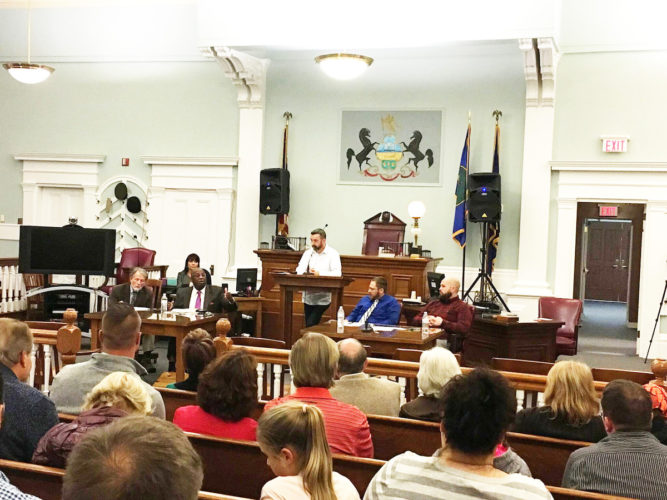 Michael Cappelli - The Yellow Jacket
Michael Cappelli - The Yellow Jacket For George Blystone, a member of the Greene County community since 1970, the addiction epidemic is not just a local issue. It was his life.
A Town Hall Meeting hosted by Steps Inside, Inc., was held at the Greene County courthouse last Thursday, Oct. 26, addressing ongoing drug issues in the Western Pennsylvania area.
Blystone was in attendance, reflecting on his own experiences. He battles with alcoholism every day. He was addicted to alcohol for six years, but has been sober for 38. For Blystone, the turning point in his life was when his wife and other members of his family reached out to him.
“What changed was my family,” said Blystone. “I was married, at the time, and my wife said ‘If you don’t straighten up, I’m leaving.’”
After getting clean, Blystone got involved with the Community Recovery committee of Steps Inside, a corporation that hosts meetings recovering drug and alcohol addicts.
At the meeting Thursday, the first of four speakers, Dr. Michael Crabtree, full professor of psychology at Washington & Jefferson College, gave a presentation focused on people most vulnerable to abusing drugs.
“Homeless people, people with mental health problems, veterans and people in the criminal justice system definitely have a certain need,” said Crabtree.
Crabtree emphasized a difference in how millennial youth handle life stresses, as well as poor access to mental health care, as contributors to the area’s drug problem.
After Dr. Crabtree, Dr. Morris Harper, vice president of telehealth solutions, rose to speak. Harper talked about different treatment options for addicts—specifically for people addicted to opioids, like prescription pain medications or heroin.
“There is no one method of treatment for each patient,” said Harper.
Harper went on to explain different methods of treatment, including the use of the substance, suboxone. While this method can be effective, some people, including Blystone, do not agree with it.
“The medication is a crutch, and another addiction to make you feel better,” said Blystone. “And they want you stay on it and you just can’t do that.”
Blystone believes something within the person has to change, and that there needs to be a greater understanding of the disease.
But Harper believes that educating people is just not enough.
“We haven’t given people who relapse anything except an education,” said Harper.
Counseling is another method that Harper suggested, and one that Blystone successfully utilized to get clean.
The third speaker of the meeting, Thomas Schlosser, a counselor that specializes in addictions, compared people to gardens. He held the idea that someone can become an addict as a result of a poor environment.
“In 2017, anyone really has a predisposition to abuse drugs,” said Schlosser. “It can look like anyone. The stigma of the ‘junkie’ under the bridge just isn’t true anymore.”
As a counselor, Schlosser has encountered several types of addicts, and is familiar with the road to recovery.
“There is no quick route to get people help,” said Schlosser. “The 30-day treatment is a building block; but really, the long-term program is more successful.”
Hearing this, Blystone reflected on his own rehab experience. He agreed that a formal program was instrumental to helping him rebuild his life.
“I went for 28 days to Gateway Rehab, and if I had gotten out early, I would have been right back at it,” he said.
The last speaker of the night, Matthew Pelton, a clinical aid and a recovery coach, shared his experiences as a former addict.
Pelton works with the Adult & Teen Challenge program in western Pennsylvania. He is a graduate of the same program, and now wants to help others bounce back from addiction.
“The accountability in my life, as well as Teen Challenge really helped,” said Pelton.
After Pelton finished speaking, the floor was opened for the people of the town to ask questions.
Blystone was not the only recovering addict in the crowd. Several attended the meeting and felt it imperative for Greene County to obtain more help attacking the epidemic.
Blystone suggested a scholarship program to help more people get into a detox program in the state—as there are currently no detox facilities in Greene County.
“This town has a big problem with no detox, [and] the hospital doesn’t want to be involved with that,” said Blystone. “We have to get what they call scholarships. The scholarships give the person the money to get into detox.”
At the meeting’s end, listeners were invited speak to the panelists individually.
Blystone thinks town hall meetings are a helpful step in helping the area work towards recovery, but feels strongly that Waynesburg needs a detox program.
“We need these things in our town, because people are dying,” said Blystone.
